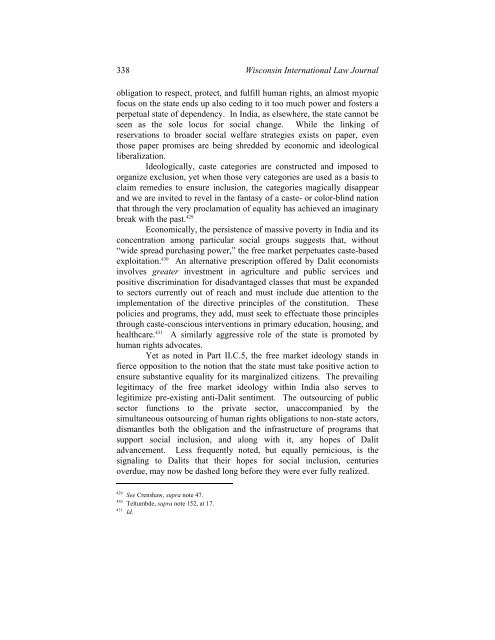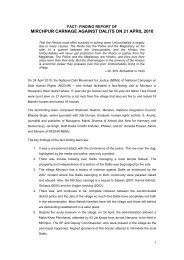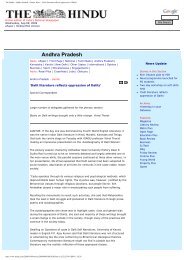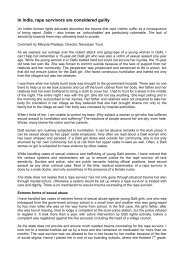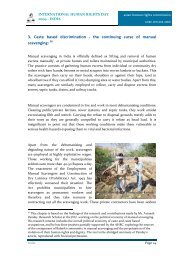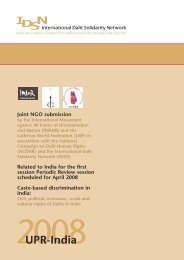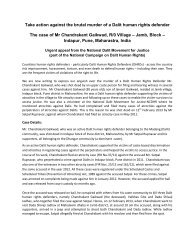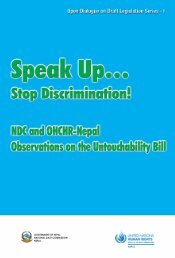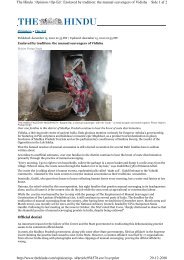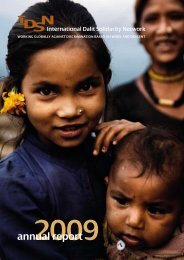equal by law, unequal by caste - International Dalit Solidarity Network
equal by law, unequal by caste - International Dalit Solidarity Network
equal by law, unequal by caste - International Dalit Solidarity Network
Create successful ePaper yourself
Turn your PDF publications into a flip-book with our unique Google optimized e-Paper software.
338 Wisconsin <strong>International</strong> Law Journalobligation to respect, protect, and fulfill human rights, an almost myopicfocus on the state ends up also ceding to it too much power and fosters aperpetual state of dependency. In India, as elsewhere, the state cannot beseen as the sole locus for social change. While the linking ofreservations to broader social welfare strategies exists on paper, eventhose paper promises are being shredded <strong>by</strong> economic and ideologicalliberalization.Ideologically, <strong>caste</strong> categories are constructed and imposed toorganize exclusion, yet when those very categories are used as a basis toclaim remedies to ensure inclusion, the categories magically disappearand we are invited to revel in the fantasy of a <strong>caste</strong>- or color-blind nationthat through the very proclamation of <strong>equal</strong>ity has achieved an imaginarybreak with the past. 429Economically, the persistence of massive poverty in India and itsconcentration among particular social groups suggests that, without“wide spread purchasing power,” the free market perpetuates <strong>caste</strong>-basedexploitation. 430 An alternative prescription offered <strong>by</strong> <strong>Dalit</strong> economistsinvolves greater investment in agriculture and public services andpositive discrimination for disadvantaged classes that must be expandedto sectors currently out of reach and must include due attention to theimplementation of the directive principles of the constitution. Thesepolicies and programs, they add, must seek to effectuate those principlesthrough <strong>caste</strong>-conscious interventions in primary education, housing, andhealthcare. 431 A similarly aggressive role of the state is promoted <strong>by</strong>human rights advocates.Yet as noted in Part II.C.5, the free market ideology stands infierce opposition to the notion that the state must take positive action toensure substantive <strong>equal</strong>ity for its marginalized citizens. The prevailinglegitimacy of the free market ideology within India also serves tolegitimize pre-existing anti-<strong>Dalit</strong> sentiment. The outsourcing of publicsector functions to the private sector, unaccompanied <strong>by</strong> thesimultaneous outsourcing of human rights obligations to non-state actors,dismantles both the obligation and the infrastructure of programs thatsupport social inclusion, and along with it, any hopes of <strong>Dalit</strong>advancement. Less frequently noted, but <strong>equal</strong>ly pernicious, is thesignaling to <strong>Dalit</strong>s that their hopes for social inclusion, centuriesoverdue, may now be dashed long before they were ever fully realized.429 See Crenshaw, supra note 47.430 Teltumbde, supra note 152, at 17.431 Id.


